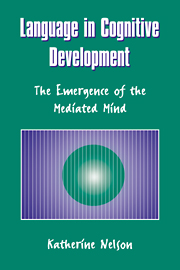8 - The Emergence of the Paradigmatic Mind
Published online by Cambridge University Press: 05 June 2012
Summary
Are hierarchical category structures natural products of human cognition independent of language? Or do they depend on language for their development? As discussed in Chapters 4 and 5, language is based on categories of various kinds, from phonemes to sentences to word classes and lexical referents. Moreover, as reviewed in Chapter 4, research has documented that infants categorize objects at varying levels of generality from global to specific. Perceptual categorization is characteristic, not only of human infants but of all complex organisms that must distinguish between food and not-food, species members and others, for example. Thus categorization is basic to cognitive functioning of all kinds, and certainly to the construction of event representations, mimetic symbols, basic and complex language, and narrative.
However, hierarchical categorization or taxonomic classification goes beyond this basic level. It operates on basic categories and sets them into new order relationships with other categories at the same level and at higher and lower levels. These operations are engaged in by people in all cultures (Berlin, 1978), who form “folk taxonomies” of plants and animals, for example. The questions as to when children are capable of engaging in these kinds of ordered relations, and what cognitive competencies are required (for example, what logic), have long been topics of study in developmental psychology.
Information
- Type
- Chapter
- Information
- Language in Cognitive DevelopmentThe Emergence of the Mediated Mind, pp. 223 - 258Publisher: Cambridge University PressPrint publication year: 1996
